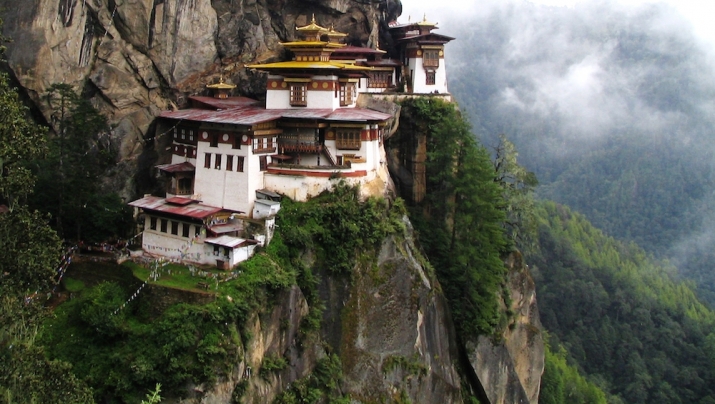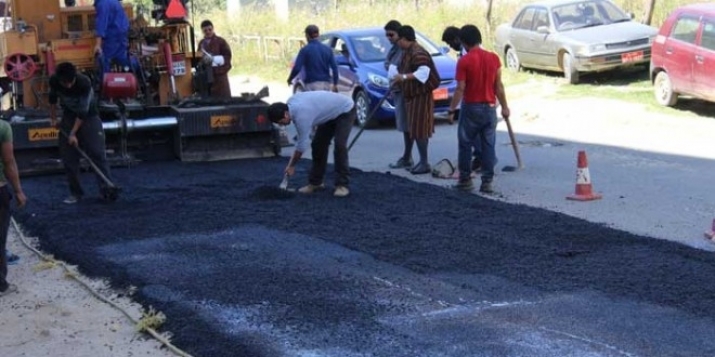NEWS
Buddhist Himalayan Kingdom Paves the Way to a Cleaner Future
 The iconic Taktsang Palphug Monastery in Bhutan's upper Paro valley. From Wikipedia.org
The iconic Taktsang Palphug Monastery in Bhutan's upper Paro valley. From Wikipedia.orgAs dignitaries gather in Paris for the 21st session of the Conference of the Parties (COP21) to the UN Framework Convention on Climate Change (UNFCCC), where a delegation of Buddhists plans to submit a landmark call from senior Buddhist leaders urging the world's politicians to address the causes of climate change,* Bhutan is making its own strides in pushing environmental stewardship to the forefront with an innovative recycling initiative that is aimed at diverting the plastic waste that is overburdening its landfills.
While Bhutan, a small Vajrayana Buddhist nation nestled in the foothills of the Himalayas between India and China, has a population of just 780,000 people and the problem of plastic pollution is a relatively new one, the country is already experiencing difficulties coping with the avalanche of plastic waste that has accompanied its conservative approach to economic development.
In a move to combat the plastic blight, the Green Road project, a new public-private enterprise set up by Bhutanese entrepreneur Rikesh Gurung, plans to pave Bhutan’s roads with bitumen mixed with plastic—so much of the stuff that, if the project is successful, road construction could soon consume most if not all of the country’s plastic waste.
“We will use the plastic waste to build eco-friendly and durable roads in the country,” said Gurung, who in October built a pilot 500-foot stretch of road in the capital of Thimphu that consumed about 1,135 pounds of plastic waste collected from a nearby landfill. “Recycling plastic waste and not burning [it] is the correct approach to protect the environment,” he added. (Reuters)
Gurung said the project was expected to reduce the amount of bitumen that Bhutan imports from India by 40 per cent and to reduce the quantity of plastic waste headed for the Himalayan nation’s landfills by a similar 30–40 per cent. The innovator noted that while only 10–15 per cent of the road-paving concoction would come from plastic, he expected that to be sufficient to consume all the plastic waste produced by the small nation.
Gurung projected that a ton of bitumen would be saved for every kilometer (0.62 miles) paved of a 12 feet wide road using the hybrid material. He also expressed optimism that plastic-infused roads would not require maintenance for at least five years, compared with often annual repairs required for more traditional road surfaces due to the country’s harsh mountain climate.
 In a pilot run, Green Road project employees surface a road in Thimpu with plastic-infused bitumen. From kuensel online.com
In a pilot run, Green Road project employees surface a road in Thimpu with plastic-infused bitumen. From kuensel online.comUnder the initiative, Gurung said, the country’s first waste-recycling plant, set up by the project, had begun collaborating with a private construction company, the state Department of Roads, and the municipal corporation to use the plastic mix to blacktop roads across the country.
“We are monitoring the [project] and it has already been a success. We plan to replicate the same in other parts of the country,” said Department of Roads chief engineer Chador Gyeltsen. (Reuters)
Bhutanese teacher and Buddhist Passang Tshering, author of the blog PaSsu Diary: Journal of an Ordinary Bhutanese, is a vocal supporter of the project, saying, “Recently after landfills got overwhelmed, we realized that plastic has become a problem even in our country. The best we could do [previously] is to resell the plastic waste back to India as scrap since we don’t have the technology to recycle it.” (Fusion)
Tshering said he believed the project had the potential to transform the way Bhutan handles its waste. “I see this as a continuous solution to our growing problem. If plastic lasts forever, let it last forever as good roads,” he said. “The Green Road project is going to be a big national service.” (Fusion)
While the initiative’s existing efforts rely primarily on lighter waste, such as plastic bags, going forward, Gurung plans to expand the scope of the Green Road project by using PET bottles and hard plastic to manufacture sewer covers and other drainage blocks.
“While the rest of the world is suffocating with their plastic waste, looks like Bhutan is going to face plastic waste scarcity,” said Tshering in his blog. (Reuters)
* Top Buddhists Sign Landmark Statement on Climate Change to Global Leaders (Buddhistdoor Global)
See more
This Buddhist kingdom is paving roads with plastic waste (Fusion)
In Bhutan, the road to green development is paved with plastic (Reuters)
There’s a Good Reason Why Plastic Bottles Are Littering the Roads in Bhutan (takepart)
First plastic waste road laid in Thimphu (Kuensel)
PaSsu Diary: Journal of an Ordinary Bhutanese (Homepage)














